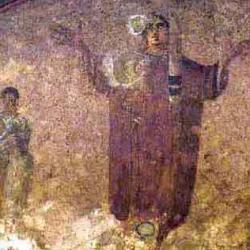The following is a response from Gerry McDermott to my response to his response to my essay. The remainder of this post is from Gerry:
I agree that Newman’s “continuity of principle” can be slippery in application. The question begged is indeed, “Who decides”?
Which makes the question all the more important for Protestants. Liberal Protestants have chucked the theological tradition and even the Bible as normative for answering the question. For, as they would say, the tradition and the biblical authors didn’t know what “we all now know” from that new revelation—that New New Testament—aka the social sciences since the 1960s. (Notwithstanding the fundamental disagreements among social scientists on the meaning of sex and marriage and so much else.) So for liberal Protestants the answer to the question of who decides is “you and me.” As long as we agree with the new orthodoxy on those things. And if we don’t, then we must be fundamentalist literalists who want to reserve the goodies of marriage to people like ourselves.
That leaves the evangelicals, the other significant group of Protestants. Do they know who decides? Well, for many of them, it is the autonomous self—not wholly unlike their liberal Protestant neighbors. Their reasoning goes like this: “I have the Holy Spirit. And I have the Word of God. So I can figure it all out for myself. After all, didn’t Luther teach the priesthood of every believer? And when I read the Bible, I find lots of things that don’t jive with what tradition teaches. So I must stick with what I think is the Word of God and not the traditions of mere men.”
This was the hermeneutic which animated many American Christians in the nineteenth century—no creed but the Bible. It was also the hermeneutic that led many to abandon orthodoxy and hitch their wagons to emerging liberalism at the turn of the 20th century in America. For common sense reading of the Bible would rarely yield what was being proclaimed in the creeds. It is still the hermeneutic for a majority of evangelicals today.
Today’s American evangelicalism is rife with universalism, antinomianism, and feel-good sentimentalism. All of which are also rife in Protestant liberalism.
So what does Protestantism need today? I dare say it does not need invitations to apocalyptic surprises or revolutionary innovations.
And if Newman’s “continuity of principle” is slippery in application, how much more slippery would an alternative be? Especially if not anchored by the six other criteria Newman enumerated?
Of course, Rome has an answer to the question of who decides—the magisterium. It is sometimes slippery when it interprets and applies it. But what do Protestants have? How are they to prevent innovation from becoming heresy—as has been the case all too often in the past and continues to be?
One more thing. I agree with Peter that Jesus appeared to be a lawbreaker because of his then-revolutionary reconciliation of what appeared to be antinomies. But the history of Protestantism—even more than Catholicism—has been far too ready to declare in supersessionist fashion that Jesus broke fundamentally with the Judaism he inherited.
This is the beginning of an ocean-size discussion, but suffice it to say here that the Christian tradition has generally been wrong to think that Jesus was breaking Jewish law when he told his disciples—in what is said to be the quintessential example of law-breaking—they could pluck heads of grain on the Sabbath. Jesus himself appealed to Tanach—as the illustration of Torah law—to justify his actions, and the Mishna permitted such gleaning when people are famished, since, the rabbis wrote, the Sabbath is all about preserving life.
So Jesus was not as revolutionary as is sometimes claimed, at least in relation to the Jewish tradition. And while his resurrection was pivotal for salvation history, it too was not unJewish, as Jon Levenson showed in his Resurrection and the Restoration of Israel.
So if Newman’s criteria are not reliable, what are the rules that will keep Protestants from sliding off the rails of orthodoxy? At this point in Protestantism’s history, I think this is perhaps the more critical question.
Gerald R. McDermott
Roanoke College















